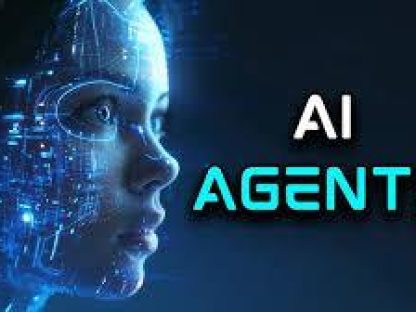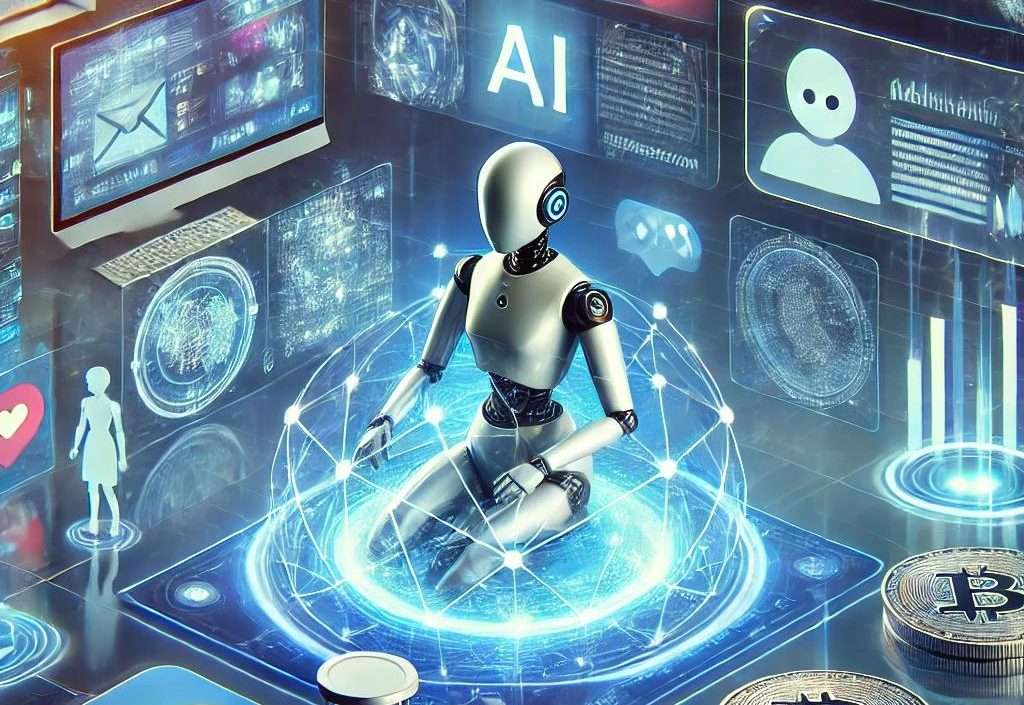As the world continues to embrace digital transformation, AI agents are emerging as one of the most transformative technologies. These intelligent, autonomous agents are reshaping how businesses engage with customers, streamline operations, and offer personalized experiences.
AI agents operate as virtual assistants or digital entities that can make decisions, take actions, and learn from interactions. Their presence spans platforms like social media, messaging apps, customer support channels, and even blockchain ecosystems.

What Are AI Agents?
AI agents are autonomous software entities designed to simulate human-like decision-making and interaction. Unlike traditional chatbots, AI agents are more sophisticated, capable of learning, adapting, and operating independently. These agents can be embedded in platforms like Twitter, Telegram, and Discord, where they engage with users, provide support, and drive business goals.
Key Characteristics of AI Agents
Autonomy – Operating Without Human Intervention:
Modern AI agents are built for independent operation. Once deployed, these agents can analyze inputs, make decisions, and execute actions without constant human guidance. From answering customer queries to executing backend processes, autonomy enables scalability and efficient task execution across different industries.
Transparency and Security
Choosing the right DeFi project can be risky and overwhelming. AI-powered wallets address this challenge by analyzing thousands of decentralized finance (DeFi) protocols using machine learning algorithms. They assess factors like smart contract vulnerabilities, liquidity levels, historical returns, and governance reputation to recommend only trusted, reliable projects. This empowers users to explore DeFi safely, with AI acting as a personalized advisor highlighting the most credible opportunities in staking, yield farming, lending, and borrowing.
Continuous Learning Through Machine Learning
A core strength of AI agents lies in their ability to learn and evolve over time. Leveraging machine learning algorithms, these agents analyze historical interactions and user feedback to refine their knowledge base. This allows them to deliver smarter, more accurate responses, adapting to new use cases, language patterns, and user preferences without requiring manual reprogramming.
Context Awareness for Accurate Responses
AI agents go beyond keyword detection—they understand context. Whether it’s identifying user intent in a conversation or recognizing previous interactions, they use Natural Language Understanding (NLU) and contextual memory to craft relevant and coherent responses. This contextual intelligence improves communication quality, making interactions feel human-like and personalized.
Multi-Platform Functionality for Omnichannel Support
Today’s AI agents aren’t limited to a single channel. They can be integrated across various digital platforms, including messaging apps (like Telegram, WhatsApp), social media (Twitter), blockchain environments (smart contracts, Web3 apps), and traditional websites. This multi-platform support ensures consistent engagement across user touchpoints, enhancing reach and accessibility.
Comprehensive Educational Resources
Education is critical in onboarding new users into Web3. These wallets integrate AI-generated educational content directly into their platforms. Step-by-step tutorials, context-aware help sections, and interactive guides empower users to understand concepts like smart contracts, decentralized exchanges (DEXs), or yield farming. Personalized learning paths tailored to individual progress ensure that even complete beginners can gradually become confident DeFi participants.
How Do AI Agents Work?
- Creation and Customization: The journey of an AI agent begins with defining its identity. Businesses or developers configure parameters such as the agent’s persona, tone, communication style, and decision-making logic. This ensures the agent aligns with the brand’s voice, objectives, and target audience. Whether formal, casual, or playful, the agent’s personality is tailored to suit business goals.
- Seamless Platform Integration: Once designed, the AI agent is integrated into various platforms like Telegram, Twitter, Discord, websites, or enterprise software. APIs, SDKs, and no-code platforms simplify deployment. On these platforms, the agent actively engages users by responding to queries, providing support, or automating processes, serving as a digital representative of the brand.
- Learning, Adaptation, and Performance Optimization: Post-deployment, AI agents constantly learn through interactions. Leveraging natural language processing (NLP) and reinforcement learning, they evaluate each conversation, improving their understanding of user behavior, preferences, and needs. Over time, this allows the agent to optimize its decision-making processes and refine its conversational abilities, delivering more relevant and satisfying interactions.
- Blockchain and Tokenization Integration: Some advanced AI agents incorporate blockchain technology to enable decentralized features. Through tokenization, businesses can reward users with crypto tokens for engaging with the agent, completing tasks, or participating in community-building activities. Blockchain integration also unlocks premium access, secure interactions via smart contracts, and transparent reward systems. This fusion of AI and blockchain paves the way for innovative business models, from decentralized customer service to gamified engagement ecosystems.

AI’s Role in Preventing Fraud
AI is critical in securing Web3 wallets against fraud. It monitors transactions in real time, identifies unusual patterns, and takes immediate action when necessary. Here’s how:
- Pattern Recognition: AI learns user behavior to flag suspicious activities.
- Anomaly Detection: It spots transactions that deviate from normal activity, like sending funds to unknown addresses.
- Behavior Analysis: Sudden changes in user habits trigger alerts for further investigation.
- Location Monitoring: AI flags transactions from unfamiliar locations for review.
- Blacklist Checks: Transactions involving flagged addresses are blocked.
- Real-Time Alerts: Users are notified instantly about any unusual activity.
With these features, AI-powered wallets provide a robust security layer, ensuring user assets stay protected.
How Do AI Agents Work?
- Creation: Businesses or developers define the agent’s persona, tone, and behavior. This customization ensures the agent aligns with the brand’s voice and objectives.
- Integration: The AI agent is then embedded into platforms like Twitter, Telegram, and Discord, where it interacts with users.
- Learning & Adaptation: As users interact with the agent, it uses machine learning algorithms to improve responses and decision-making.
- Tokenization: Some advanced agents leverage blockchain technology, enabling tokenized rewards, premium features, and other blockchain-based interactions.
Benefits of AI Agents
- 24/7 Availability: Unlike human agents, AI agents work around the clock, ensuring continuous support.
- Cost Efficiency: AI agents reduce the need for large human support teams, significantly lowering operational costs.
- Scalability: Companies can deploy multiple agents simultaneously to handle large volumes of user requests.
- Personalization: AI agents learn from user interactions to offer personalized recommendations and responses.
- Brand Consistency: Customizable personas ensure that the agent’s tone, language, and behavior align with the brand’s image.
The Role of Blockchain in AI Agents
With the rise of Web3, AI agents are evolving beyond traditional chatbots. Blockchain technology is playing a key role in enabling new functionalities like:
- Token-Powered Transactions: AI agents can use tokens to reward users or enable paid services.
- Agent Marketplaces: Businesses can showcase and sell AI agents to a global user base.
- Wallet Integration: Secure wallets allow users to manage tokens and transactions directly through AI agents.
The Future of AI Agents
The future of AI agents is marked by increased intelligence, blockchain integration, and wider adoption. As businesses look for more innovative ways to automate tasks and engage users, AI agents will continue to evolve. From customer service to decentralized finance (DeFi), AI agents will play a key role in shaping how companies interact with customers and manage operations.
Conclusion
AI agents are not just a trend; they are the next phase of intelligent automation. Their ability to engage users, automate support, and enhance blockchain interactions makes them a valuable asset for businesses. As technology advances, AI agents will become more adaptable, context-aware, and capable of driving business growth.
Whether you’re looking to streamline customer service, increase sales, or boost user engagement on blockchain platforms, AI agents offer endless possibilities for growth and innovation.
Our Services:
- AI Solutions
- RWA Tokenization
- Telegram Mini Apps
- DeFi/DApp Solutions
- NFT Marketplaces
- Launchpad
Why Choose Us? Industry Expertise | Global Reach | Rapid Time-to-Market
Let’s build the future together. www.blocsys.com

